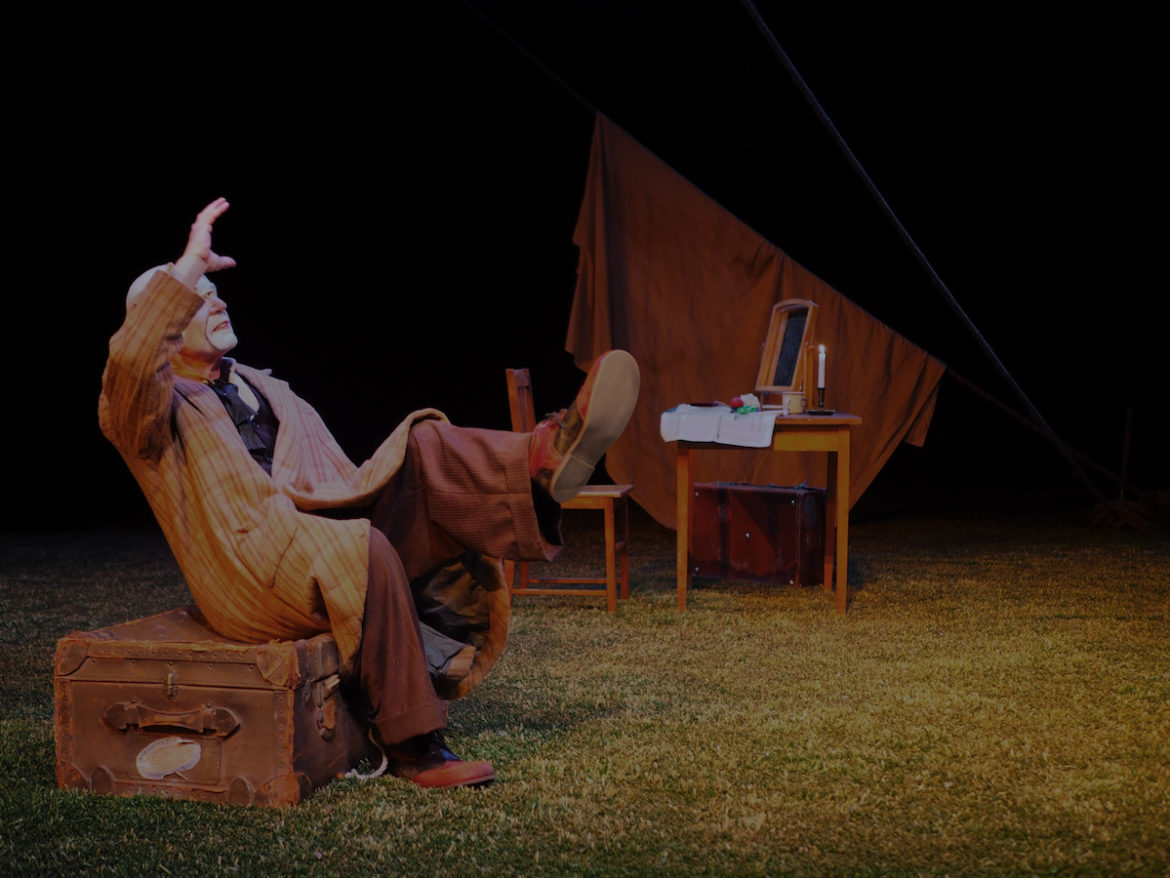A brilliant performance, a fascinating text, and yet…Robert Reid on Scaramouche Jones
A rope on poles is stretched across the stage of the Fairfax, struck at a jaunty angle to suggest a circus tent. Astroturf covers the floor and a festoon of bare light globes reaches out over the audience, beneath which sits a small wooden table, a chair and a candle. A clown enters: floppy shoes, white face, red nose, oversized overcoat. This is Scaramouche Jones.
Written by Justin Butcher and originally performed in London in 2001 by Pete Postlethwaite, Colin Friels reunites with director Alkinos Tsilimidos to take on the 80 minute monologue. Friels and Tsilimidos last worked together on Red at the Melbourne Theatre Company in 2012.
Jones, fresh from his final performance, sits down and checks the newspaper to find that the acrobat has been at the crossword again. He mutters to himself, some prefatory, expositional remarks. He can see us, he tells the audience. He lifts his eyes from his internal monologue and looks out at the ghosts of past, present and future, bridging the logical gap between solo performer and audience without breaking the illusion of the fourth wall. Jones remains in character and in his world, but attempts to draw us into his fiction. But we can’t join him: instead the gulf between the real and the imagined is highlighted.
Scaramouche Jones was born in Trinidad in 1900 to a sex worker and an Englishman, from whom he inherits his much-remarked-upon white skin. Born on the first day of the 20th century as the fireworks and celebrations begin, he is determined to die on this hour, the last of that same century. “It’s enough,” he says. But before he goes, he will tell us his story: a Boys Own Adventure-style tour of the first half of the colonial 20th century.
Alone on stage for 80 minutes, Friels holds the attention of the audience completely. It’s an accomplished performance by a master performer. With only fifteen minutes left in the show, a longish sequence occurs in complete silence, as Jones acts out his comic routine from the concentration camps for the Nuremberg trials. The Fairfax is filled with breathless silence: I haven’t heard an audience so completely hushed by the command of a single performer for a long time.
Friels takes us on a tour of the accents and dialects of the decaying British empire that is bewildering in its compass. I’m given to understand that this is part of the fun, but I have trouble seeing past the appropriation. It’s troubling that a white European is “doing the accents” of the colonised peoples of the old empire. Accents bother me: I generally struggle to see why it might be too hard to engage with a work set in the US or Britain without affecting the accompanying accents. Is it so disconcerting to hear an Australian accent on an Australian stage?
I spend the first ten minutes or so of Scaramouche Jones cringing but by the end, I’m almost convinced. It’s a seductively colonising work. Butcher described these stories, among other things, as “the fate of the lost race known as the English.” I don’t know he meant it ironically: although Jones proudly insists that he is an Englishman, his story is that of a refugee from the collapsing Empire, buffeted on the raging waters of the first half of the last century.
Jones tells us that his story is about learning to wear a series of masks: the seven white masks of Scaramouche Jones. He removes his costume as he tells us the story of how he acquired them: his skin colour from his English father, grease paint from his circus training, lime dust from mass graves at the concentration camps.
The language, in the way of monodramas, is liberally adorned with description. While its musicality is beautiful, the style results in some very long run-on sentences (and this is me talking, the king of the run-on sentence). By the end of some of Jones’s stories, I’ve forgotten how they started. Butcher’s characters are detailed and Friels makes each one unique, allowing each their individual humanity. There’s nothing in this performance of the Colin Friels we know from tv or movies: he disappears behind the mask(s). It’s a captivating performance and an engaging story.
But I’m conflicted by Scaramouche Jones. There is a lot to be conflicted by – in the text, in its performance and in the history it presents. I’m reminded of Frantz Fanon’s Black Skin, White Masks: “In the world through which I travel, I am constantly creating myself.” Jones recreates himself again and again to survive in a world that sees him a something less than human, a black man with a white face. But I also think of Fanon’s caveat: “… the white man, however intelligent he may be, is incapable of understanding Louis Armstrong or songs from the Congo.”
I think too of Roland Barthes’ analysis of a cover of Paris Match magazine, in which he considers an image of a proud young African boy giving the French salute in the uniform of the French military academy. Barthes says it tells its viewers that the colonised are happy in their colonisation. It tells us that life is better for the colonised after the intervention of the empire. Likewise, the characters in the slums and slave pits of Scaramouche Jones teach Virgil and quote Shakespeare and consider that, all in all, they’ve not done too badly. For all its critique, the play valorises the fallen British Empire and risks renormalising the elements of colonisation in contemporary society.
These are charming stories and characters. In their retelling, I think it’s important to keep in mind what that charm serves. After all, propaganda often masquerades as nostalgia.
Scaramouche Jones, by Justin Butcher, directed by Alkinos Tsilimidos. Design by Richard Roberts, lighting by Matt Scott, sound design by Tristan Meredith. Performed by Colin Friels. At Arts Centre Melbourne. Closed Saturday.

